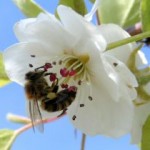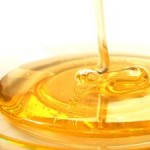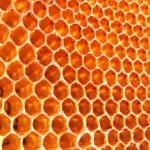How Is Natural Honey Made?
 There are seven known species of the honey bee which are part of the genus apis and only members of the genus apis are considered true honey bees. A honey bee makes natural honey by collecting pollen from plants and depositing it in the nests which they make from wax, ingesting the pollen and regurgitating it until it is a desired quality.
There are seven known species of the honey bee which are part of the genus apis and only members of the genus apis are considered true honey bees. A honey bee makes natural honey by collecting pollen from plants and depositing it in the nests which they make from wax, ingesting the pollen and regurgitating it until it is a desired quality.
The moisture is evaporated down to approximately 17% during the process of making the honey and the honey bees aid in this process whilst inside the nest, by fanning their wings. In the process of making honey, the honey bees add an enzyme called invertase that converts sucrose into glucose and fructose, put in simple terms.
The process of evaporation prevents fermentation and the enzyme that changes the composition of honey prevents bacteria and mold, etc from growing.
Once the process of making honey is complete, the honey bees seal the comb with bee wax.
This honey can have various flavors and colors and these are a result of the location of the bee hive and the surrounding plants where the bees collect their pollen.
The flavor of honey can also vary depending on whether the bees are mono-floral; collecting from only one type of plant or Poly-floral where the honey bees have access to more than one plant source.
For those of you interested in further information, you can visit the Australian Honey Bee Industry Council or International Bee Research Association.
What You Should Know About Honey
 Aside from the various flavors and colors of natural honey the main thing to be aware of is the process of the removal and treatment of honey by honey collectors. Honey bees themselves also need to be left with honey they produce as they need it to survive.
Aside from the various flavors and colors of natural honey the main thing to be aware of is the process of the removal and treatment of honey by honey collectors. Honey bees themselves also need to be left with honey they produce as they need it to survive.
It is not recommended to give natural honey to infants under 12 months. Honey naturally contains botulinum endospores and therefore infants can contract botulism due to the fact that they have an immature digestive tract. This point aside, honey has many health benefits that have been known for years.
If you are suffering from food intolerance symptoms that are related to salicylates, a naturally occurring chemical in honey, then you best use a pure maple syrup such as pure, organic maple syrup or golden syrup as an alternative. You will need to use the alternatives until you can sort out your food problems and learn how to heal yourself. For those suffering from food intolerance symptoms, you should be aware that natural honey is considered very high in salicylate content according to the Friendly Food cookbook.
Raw natural honey; honey that has not been heat treated, has a higher nutritional content than natural honey that has been heat treated. Many types of honey that are available through your grocer have been heat treated. The important thing to be aware of, is the temperature at which the natural honey has been heated. Honey that has been heated above 37 Degrees Celcius starts to lose its nutritional content as do all foods and the higher the temperature. Honey that is heated on a low setting still has health benefits. However, consuming raw, natural honey, is the best way to have your honey, honey 😉
Sadly, there are people out there that are making fake honey instead of letting the bees do their wonderful work to produce natural honey. If you are in doubt about whether you have natural honey or fake honey, you can do a couple of simple tests. Take a teaspoon of honey and drop it in water. If it dissolves, then it is not natural honey. You can also try a dollop of the honey on paper towel to find out if it is natural honey. If the honey is absorbed then it is not natural. Raw honey tends to have white bubbles around the top and has specks of dust because it is pure and due to the removal process.
I have one last point . Honey does have a tendency to absorb smells so be sure to keep it well sealed, preferably in a glass jar. The great thing is that it does store for a long time due to its properties, so there’s no need to refrigerate it.
Bee Hive Collapse Concerns
 Unfortunately, not all is well in the bee world. There has been a spread of bee hive collapses, or what is called Colony Collapse Disorder and this in turn has a huge impact on the production of honey and also the food sources due to the lack of pollination. This is something we should most certainly be concerned about because without bees to contribute to the food chain, humans will cease to exist. With so much change going on with GMO going unchecked and pesticides being injected into plants and food sources, we need to look closely at this impact of GM on us and bees. You can read more about bee hive collapse by clicking here and I encourage you to make a donation at this website.
Unfortunately, not all is well in the bee world. There has been a spread of bee hive collapses, or what is called Colony Collapse Disorder and this in turn has a huge impact on the production of honey and also the food sources due to the lack of pollination. This is something we should most certainly be concerned about because without bees to contribute to the food chain, humans will cease to exist. With so much change going on with GMO going unchecked and pesticides being injected into plants and food sources, we need to look closely at this impact of GM on us and bees. You can read more about bee hive collapse by clicking here and I encourage you to make a donation at this website.
Health Benefits of Honey
The Farmacist Desk Reference has some great information about using honey to keep you healthy. According to the Farmacist Desk Reference, honey is good for the brain, heart and as a nerve cleanser. You can also use it for a sore throat, to apply topically and to simply put you to sleep at night. It is also good for those who want to get a better night’s sleep without the need for a midnight toilet stop.
Due to a large amount of research into the health benefits of honey, doctors are now coming to realize just how powerful it is and the many uses for it as a healer. I am hoping that more of these natural products come full circle as we start to realize the negative impact that pharmacy drugs are having on our health. Honey is a wonderful alternative to sugar and is often times added to tea.

The types of plants that the bees have had access to in their area and close to their hive, will determine what you will see on your grocer shelves.

Disclaimer:
I’m no medical expert and information contained on this blog is written through my own experience with the aim of furthering your education on health. It is your responsibility as to how you use this information and I cannot be held liable for any misinterpretation or misuse of the information provided.





Mmmm-mmmm.. one of my favourite blogs talking about one of my favourite subjects. Mmmm-mmmm. Thank you.
.-= jo´s last blog ..Empowering Mindset – Persistance =-.
Thanks Jo. You made me smile and smiling is also good for the health. 🙂
Thank you Eileen for this most informative article. I will pop out and buy a jar or two of the Raw Manuka Honey ASAP. Or do you sell it by any chance? I’ll place an order if you do.
Hi Jill,
Thanks for stopping by. I have added a new jar of Manuka honey at the bottom of this post and they deliver Internationally. So, check that out first. Otherwise, if you go to a supermarket, just check the heating temperature on the jar to make sure all the goodness has not been removed. Thanks for supporting the honey bees and my business. 🙂
Thanks Eileen for your article.
Sometimes we need the gentle reminders to keep us on track with our health. My mum used to tell me that honey was good for my brain and now I tell my children that very same thing.
Honey is wonderful and must admit need to use it more.
I do love the bees buzzing around my roses as I know a byproduct is their yummy healthy honey.
.-= CherieRasmussen´s last blog ..Choosing Affiliate Marketing Programs =-.
Hi Cherie,
Nice to see you here. Your Mum and many of our ancestors in general knew what was good for us. We seem to have lost a lot of their wisdom along the way so it is nice to hear you teach that to your kids. Walnuts aree also good for the brain. The doctrine of signatures show us that because they are shaped like the brain. That’s a whole ‘nother post though.
I am hoping that we can make a difference to the colony collapse disorder too!
Regards, Eileen.
We go through a lot of honey. My boys love it on pancakes and English muffins and I like the thick creamy honey on toast. It’s also great in marinades and dressings. It always amazes me at airports around the world – every country seems to have it’s own “special” honey. I brought some back from NZ for a neighbour who had fed out bird while we were away and he was so thrilled. He said he and his wife search the supermarket shelves for the best honey – and evidently New Zealand’s is right up there. Thanks for a very interesting read. Jan
.-= Jan Littlehales´s last blog ..Raising Great Kids – Reading =-.
HI Jan,
Nice of you to share how you are using natural honey. Yes, you are right in that each country would have its own honey and that would be due to the plants that the bees have access to. How lucky we are to have the opportunity to taste different type of honey. I hope that more people will start to use it and also spare a thought for those wonderful little creatures that make it.
Regards, Eileen.
YUMMY!
Wow, you sure do know a lot about this stuff Eileen! Thanks so much for the time and care you’ve taken to bring this information to us.
I’ve just had dinner… Wish someone would make me some pancakes & honey… Or crepes & honey, mmm… even honey on crumpets or honey & lemon tea!!
Your blog is coming along great Eileen. Keep up the fantastic work.
Lina
.-= Lina Nguyen´s last blog ..Whinging: How to stop it. =-.
Hi Lina,
Yes, good help is hard to find 🙂 Thanks for your comments and look forward to reading more of your blog too!
Regards, Eileen.
Wow – lots of interesting info and an incredible resource you are building.
I have a jar of a Manuka honey in my cupboard which you have reminded me about. I don’t think it will last long…
Cheers, Tom
Hi Tom,
Thanks for stopping by for a read. I add raw honey to my green smoothies sometimes or have teaspoon just before bed knowing that while I am asleep it will work its magic. The body is considered in healing position when you are lying down.
Thanks, Eileen.
I am really concerned that genetically modified plants with their inbuilt insecticides could wipe out the world’s bee population. If this occurs, billions of people will die. As you say, much of the food we eat depends on bees in particular, and other insects, pollinating flowers at some point in the food chain. I repeat, if GM plants kill the the bees, we die.
.-= Wal Heinrich´s last blog ..Genetically Modified Foods – Are They Worth the Risk? =-.
Hi Wal,
I am against GM Food and I refuse to buy it (along with easter eggs put out at the start of February 🙂 ). I agree and I hope that blogs like yours and mine can make a difference. Thanks for sharing.
Eileen.
Hi Eileen,
What a fantastic post. I really learned a lot and I definitely fancy some honey on toast now…
Keep up the good work. Your blog keeps getting better all the time.
Lizzy
.-= Lizzy´s last blog ..Inspirational People – Tony Christiansen =-.
Hi Lizzy,
Welcome to my blog and glad you learned something. I am glad that I can help people and I continue to raise awareness on issues that impact us all. Thanks for your comments.
Regards, Eileen.
What a stupendous post! I used to mix honey with my oatmeals everyday without even knowing much about its benefits. The article made me aware of the effect of natural honey on infants, too. Thank you for posting.
Hi Martha,
Thanks for your comment. I hope also to raise the awareness of the importance of caring for bees. We need them! 🙂
Regards, Eileen.